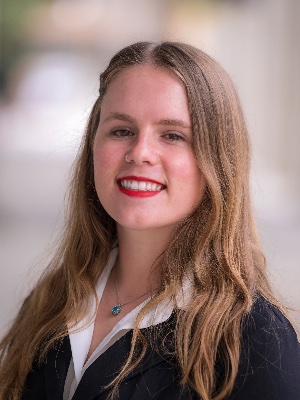Meet a Master's Student: Keeley Lanigan
Name: Keeley Lanigan
UC San Diego Biological Sciences Laboratory: Professor Carolyn Kurle
Current position: In a gap year (most interested in teaching high school and environmental consulting)
Undergraduate Institution: UC San Diego (Department of Ecology, Behavior, Evolution)
(Keeley Lanigan completed her master’s degree in December 2023)
March 17, 2024

Keeley Lanigan
Tell us about your area of focus while you were a master’s student
My study investigates dietary specialization versus generalization in a desert ecosystem food web using stable isotope analysis (a method for determining an organism’s trophic position by looking at chemical composition in the organism’s tissue). Specifically, I analyzed the stable isotopes of nine species of snakes, rats and lizards from the Yuma, Ariz. desert. Stable isotopes that exist in the food organisms eat are incorporated into the tissue of the organisms as the food is metabolized. By looking at the stable isotopes in the tissue of these organisms, we can get an idea of what these species are eating, which can help us understand interspecific relationships in this desert food web.
Why Is This Important?
This study provides insights into the dietary niches and trophic relationships of these important desert species, which is valuable for navigating animal and habitat conservation and management needs as we continue understanding the long-term impacts of climate change on extreme desert habitats. By monitoring these impacts, we will have the knowledge we need to protect these habitats and the organisms that rely on them to survive.
How Did You Get Interested In This Area?
I’ve loved wild animals since I was young. Before I even knew the word ecology I loved learning about food webs and trophic systems. Learning the ways that the presence of a single rat species on an island or the absence of otters from a shoreline could completely change an ecosystem fascinated me. I liked learning about how everything is connected to each other and how monitoring these connections and interactions can help scientists and conservationists protect natural areas.
Wild places have been extremely important to me since I can remember, and deserts hold a special place in my heart. I would camp at Joshua Tree National Park with my siblings and dad when I was little, and to this day one of my favorite places to camp is Anza Borrego State Park. You can’t fully comprehend the beauty of a desert until you visit it. Close inspection reveals an amazing abundance and diversity of life. All this life needs protection and that’s why researching desert ecology is so important to me.
While You Were A Master’s Student, What Did A Typical Day Look Like For You?
I didn’t really have typical days as a master’s student. What needed to get done varied throughout the program. Many days would be spent analyzing data in R (a coding language that is very useful for making ecological models). I would read papers almost every day on deserts, reptiles, climate change and many more subjects. And in the last quarter of the program, I spent most of my time writing my thesis.
Those were my main duties, but I also spent a lot of time taking classes and being a teaching assistant. I was a teaching assistant for three out of the four quarters I did my master’s, and depending on the class that would take anywhere from 10-30 hours of work a week.
I also would help PhD students in my lab with their lab work and sometimes other master’s students, which was super interesting.
What Did You Enjoy Most About Being A Master’s Student?
The people (faculty and other students) were my favorite part of the experience.
I had the best advisor in the world. She was always so supportive of me and my goals and was always so positive and kind. She made this experience even better.
The other people in my lab were so great and I loved getting to meet with them every week to discuss research and scientific literature. These meetings were so engaging and uplifting and were a highlight of my week. I am actually still attending them on zoom now even though I am graduated.
And the friends I made through this program were all so important to me. Friends were always so supportive and helpful when I needed it. They are all so wonderful and made this experience so great.
What Advice Do You Have For Someone Starting Out As A Master’s Student At UC San Diego?
Make friends anytime you can: in classes, in your lab, at school events. This process is so much easier when you can have good people in your corner who will be there for you to proofread a paper or just listen to you vent about your advanced statistics class. UC San Diego’s Bio Grad Program has a great culture with great people who will make these few years so enjoyable and precious. These people are everywhere and you can find them. Trust me when I say they are looking for you too.
What Is Your Favorite Type Of Food?
I love Thai food, especially curry and noodle dishes. My favorite restaurant in San Diego is a vegetarian Thai place called Plumeria.
What’s Something Most People Don’t Know About You?
I got a black belt in karate when I was 14 and I used to be a competitive figure skater.
